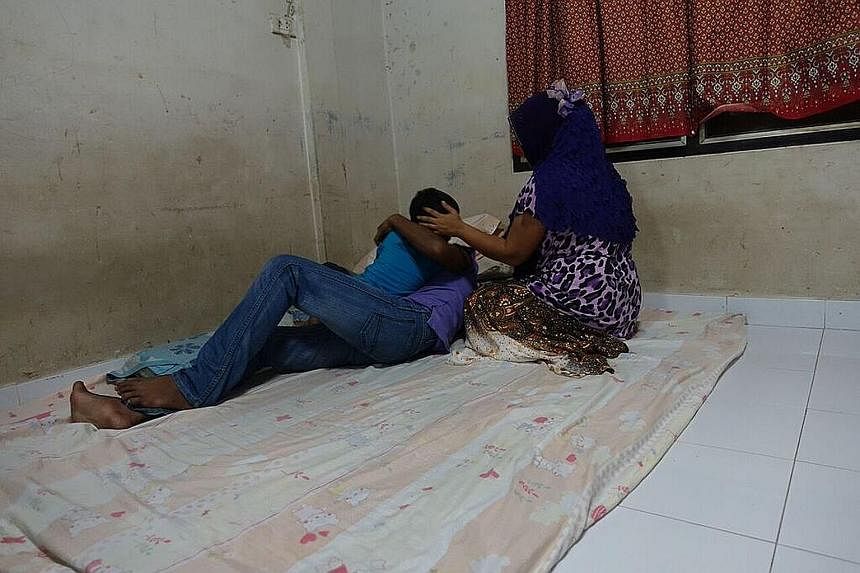BANGKOK • He was a Rohingya Muslim whose family ran a fleet of boats in Myanmar's Rakhine state. She was a Buddhist shopkeeper living in a village next to his.
In a region riven by ethnic and religious tensions, their union was not just rare but downright dangerous. Faced with persistent intimidation, they fled their homeland in 2010 on an arduous journey that eventually brought them to Thailand early this year.
Mr Abdul Islam was 19 years old when he met Ms Asimah, 28, in 2008. She had to travel twice a week to the nearby Buthidaung town to restock the groceries in her shop. The quiet, square-jawed young man waived the 1,000 kyat (S$1) boat fare each time because "we are neighbours".
One day - two years after they first met - Ms Asimah offered to buy Mr Abdul coffee. And word got around to their families and neighbours. Ms Asimah's neighbours were incensed. "They said, if we ever met again, they would take him to the police and beat him up," she told The Straits Times.

That was in 2010, before communal tensions in Rakhine state flared into outright violence that displaced hundreds of thousands of Rohingya, whom the Myanmar government rejects as illegal "Bengali" migrants. It was also before President Thein Sein signed into law curbs on inter-faith marriages widely seen as targeting Muslims.
Still, the couple feared for their lives and headed west, crossing the border into Bangladesh. They got married in a local mosque.
In Cox's Bazar, they rented a tin-roofed shack where their son Shahid was born a year later. But they struggled to make ends meet during their four years there.
Mr Abdul decided to leave Cox's Bazar, travelling to Thailand in March on a smuggler's boat. His wife - being Buddhist and, unlike him, able to travel freely through Myanmar - returned home with their son and sneaked into Thailand two months later, in May.
The smuggler painted a pleasant picture of Mr Abdul's prospective journey. "He said… there would be three persons to every cabin." The price? 60,000 baht (S$2,400).
When Mr Abdul eventually arrived on the vessel in the Bay of Bengal, there were nearly 600 people crammed into the three-tier boat and just enough space for each person to sit on his haunches, with knees up to his chest.
The boat captain fired his gun near the ear of anybody who tried to move. Many defecated where they sat, into any receptacle they could find. A young man was felled by diarrhoea and thrown overboard when he died. "I cried a lot," said Mr Abdul. "I thought I would die before I arrived."
After 40 days at sea, the migrants were put ashore on an island near the Thai-Malaysian border, before being moved to a mountainous camp in Padang Besar. It was in one of the border camps that Thai security forces would later uncover mass graves that triggered a regional migration crisis.
Like many others before him, Mr Abdul was flogged at the camp several times before his family in Myanmar paid the full amount for his journey and he was freed.
By a twist of fate, he bumped into a Rohingya friend near the Thai-Malaysian border where he was freed. This friend offered him a roof and a job in Bangkok.
Two months later, Ms Asimah spent 25,000 baht and eight days on bus journeys with her son that took them past Sittwe, Yangon and the border town of Myawaddy. There, they crossed a parched river and slipped into the Thai border town of Mae Sot. From Mae Sot, it was just a two-day road journey down to Bangkok.
Today, the family share a townhouse with two other families on the outskirts of Bangkok. Mr Abdul, now 26, spends his day hauling ice at a market for 400 baht a day.
According to a Reuters report, there were 600 Rohingya stranded in Thai shelters and immigration shelters in October. With the authorities now taking a tougher stance against undocumented migrants, the couple are wary even of straying too far from their home to seek refugee status at the United Nations office in Bangkok.
The triumph of Myanmar's opposition party led by Ms Aung San Suu Kyi over the military-backed incumbent party in last month's polls has given them some hope.
"We would like to go back to the country," Mr Abdul said. "But not now. And not to our hometown. Maybe Yangon."
- All names have been changed.


